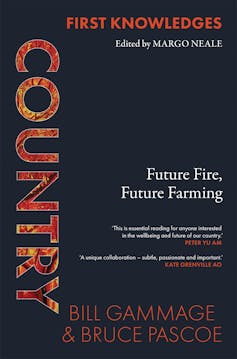Country is an urgent call to learn from Indigenous knowledges to care for the land
- Written by Taylor Coyne, Doctoral Candidate, UNSW

“We know we can do better than this, don’t we?”
This line sits towards the concluding paragraphs of Country: Future Fire, Future Farming[1], by Yuin, Bunurong and Tasmanian activist and author Bruce Pascoe and non-Indigenous historian Bill Gammage.
The book is part of the wider six-part “First Knowledges” series published by Thames and Hudson in collaboration with the National Library of Australia. It focuses on a collection of topics, including astronomy, design, law and, in the case of this book, Country.
As stated by editor Margo Neale in the introduction, the overarching series is designed to “stimulate and provoke you to enlarge your mind and expand your worldview to encompass limitless other possibilities, including ways in which you can learn from the Aboriginal archive of knowledge embodied in Country.”
For many, the book will be a timely invitation to be a part of constructive dialogue and a call to take action, especially in light of the lacklustre resolutions from COP26[2] and following the Black Summer bushfires[3].
For myself, a non-Indigenous scholar researching waters throughout Eora Country, I humbly come to this review with deep awareness of my position, and firmly take up the invitation to be part of this dialogue and follow through with action.
Read more: How the Dark Emu debate limits representation of Aboriginal people in Australia[4]
A conversation between experts
Country: Future Fire, Future Farming is crafted to present the two authors’ own personal perspectives, while drawing on rich evidence to support their claims.
After their co-written opening chapter, Pascoe starts off the book’s first three solo-written chapters. Then, Gammage takes over with the next four, before they round off their thoughts in two distinctly separate but ideologically similar concluding chapters.

















